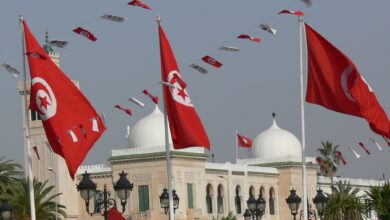US Secretary of State Hillary Clinton urged Tunisians on Saturday to protect their newly-won freedoms and called on Islamist and secular parties to work together in the country that launched the Arab Spring.
Speaking to a group of about 200 students, Clinton also urged young people to use social media and other technologies that enabled popular revolts across the region last year to hold their new rulers to account.
"After a revolution, history shows it can go one of two ways. It can move in the direction you are now headed, building a strong, democratic country, or it can derail … into autocracy, into new absolutism," Clinton said in a meeting a Andalusian-style seaside villa.
"The victors of revolutions can become their victims," she added. "You must be the guardians of your democracy."
Clinton spoke during a swing through North Africa that has been dominated by the violence in Syria, where forces loyal to President Bashar al-Assad have kept up attacks on civilians and opposition forces seeking to end his family's four-decade rule.
On Friday, she attended a gathering of nations known as the "Friends of Syria" that sought to increase political, economic and moral pressure on Assad to step down.
Russia and China have vetoed two UN Security Council resolutions designed to end the violence and other nations disagree sharply on whether to arm the Syrian opposition to help them fight Assad's forces.
In Tunisia, a popular revolt forced autocratic leader Zine al-Abidine Ben Ali to flee the country on 14 January, 2011 and the country has become a model for democratic change in the Middle East, inspiring revolutions that toppled autocratic rulers in Egypt and Libya.
The North African country has since calmly elected its own government, defying predictions it would descend into chaos, while Ben Ali's secret police have been disbanded and the news media enjoy unprecedented freedoms.
Polarization
For all its progress, however, Tunisia has acute problems of poverty and unemployment and its society is split over the rise to power of Islamists who were banned from public life for years under Ben Ali.
The moderate Islamist Ennahda party which dominates the new government has said it is will try to represent all Tunisians, including secularists who say Islam and the state should be kept separate.
But the country's political scene has quickly grown polarized, with secularist parties and the Islamists accusing each other of betraying the principles of the revolution.
Regular protests against poverty and inequality in provincial towns, some of them violent, point to a growing impatience with the democratic process. Diplomats warn this could be exploited by opportunist politicians seeking to restore autocratic rule.
Other Middle Eastern states emerging from the upheavals of the Arab Spring, especially Libya and Egypt, are facing similar issues, but Clinton said Tunisia could guide the way.
"There are those here in Tunisia and elsewhere who question whether Islamist (politics) can really be compatible with democracy," Clinton said.
"Tunisia has the chance to answer that question in the affirmative and to demonstrate there is no contradiction … and that means not just talking about tolerance and pluralism, but living it."
Clinton stressed the importance of reforming the country's economy to create more jobs, and of young people using technology such as social media "to expose corruption (and to) encourage transparency and good governance."
She also exhorted Islamist and secular parties to work together, including in the assembly which will draft a new constitution.
"To write a constitution, the governing party, Ennahda, will have to work with other parties, including secular parties, and persuade voters across the political spectrum to respect fundamental principles" such as freedom of speech, religion and association as well as the rule of law, she said.




